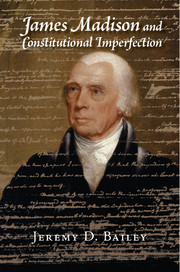Book contents
- Frontmatter
- Dedication
- Contents
- Preface
- Acknowledgments
- Abbreviations
- 1 The Madison Problem
- 2 Appeals to Tradition: The Case for and against Veneration
- 3 Appeals to Elites: The Problem with Deliberation
- 4 Public Opinion before Parties
- 5 The Turn to Public Opinion
- 6 Appeals to the People: Madison and the Revolution of 1800
- 7 Appeals to Text and History
- 8 “Take care of me when dead”
- Index
1 - The Madison Problem
Published online by Cambridge University Press: 05 November 2015
- Frontmatter
- Dedication
- Contents
- Preface
- Acknowledgments
- Abbreviations
- 1 The Madison Problem
- 2 Appeals to Tradition: The Case for and against Veneration
- 3 Appeals to Elites: The Problem with Deliberation
- 4 Public Opinion before Parties
- 5 The Turn to Public Opinion
- 6 Appeals to the People: Madison and the Revolution of 1800
- 7 Appeals to Text and History
- 8 “Take care of me when dead”
- Index
Summary
“We must refer to the monitory reflection that no government of human device and human administration can be perfect; that that which is least imperfect is the best government.”
James Madison, 1833This book attempts to answer a question that arose during my examination of Thomas Jefferson's transformation of executive power. That question is this: Given James Madison's critique of Jefferson's proposals for frequent appeals to the people, why did Madison collaborate with Jefferson to bring about and institutionalize a version of those frequent appeals? Put another way, if we assume that Jefferson's Revolution of 1800 was actually a revolution, why did Madison go along with it?
In answering this question, this book introduces and attempts to answer a second question. Specifically, what was Madison's solution to the problem of constitutional imperfection? By constitutional imperfection I mean the gaps that necessarily arise because no constitution can anticipate every contingency and opportunity, and I mean the flaws that derive from the errors of the founders. Constitutions are doomed to have both, so, as a result, those who live under one must determine whether their own constitution has a doctrine with respect to the problem of constitutional imperfection. That doctrine will have to first determine the extent of the imperfection as well as provide a remedy. The remedy might be formal amendment, judicial interpretation, legislative deliberation, executive discretion, appeals to the people, or some combination of any of these. I believe studying Madison with an eye to the problem of constitutional imperfection will liberate his thought from what can be called Madisonian constitutionalism. By examining Madison's political thought and practice unburdened by the assumptions of Madisonian constitutionalism, this book seeks to offer a fresher and more accurate account of Madison himself.
Madisonian Constitutionalism
Studies of American constitutionalism often rely on one of two well-known dichotomies. The first is the famous contest between Jefferson and Alexander Hamilton, between a strict construction of the Constitution with an emphasis on consent and a broad construction of the Constitution with an emphasis on sovereignty. The second dichotomy pits Jefferson against Madison.
- Type
- Chapter
- Information
- James Madison and Constitutional Imperfection , pp. 1 - 14Publisher: Cambridge University PressPrint publication year: 2015
- 1
- Cited by



